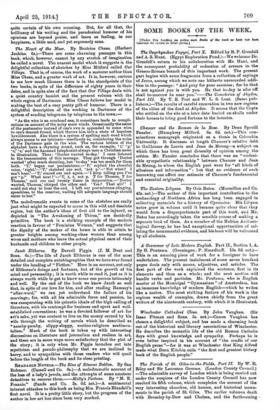The Heart of the Moor. By Beatrice Chase. (Herbert Jenkins.
6s.)—There are some charming passages in this book, which, however, cannot by any stretch of imagination be called a noveL The nearest model which it suggests is the delightful collection of sketches by Miss Mitford called Our Village. That is, of course, the work of a maturer author than Miss Chase, and a greater work of art. It is, however, curious to see how much likeness there is in the standpoints of the two books, in spite of the difference of eighty years in their dates, and in spite also of the fact that Our Village deals with a quiet country hamlet and the present volume with the whole region of Dartmoor. Miss Chase follows her model in making the best of a very pretty gift of humour. There is a delightful description of the working in Dartmoor of the system of sending telegrams by telephone to the town:— "As the wire is an overhead one, it sometimes leads to compli- cations on account of the noisy moor winds. Occasionally the name of the postmaster instead of one's own is appended to some wire to one's dearest friend, which throws him into a state of hopeless bewilderment. Also there is a system of spelling each word which always seems to me intricate—needlessly so, considering the noise of the Dartmoor gale in the wire. The various letters of the alphabet have a rhyming sound, such as, for example, 't,' .p,' 'c,"e,' and the harassed telephonist always uses a Christian name in illustration. Thus 'Doctor wanted to-day.' I once listened to the transmission of this message. They got through 'Doctor wanted' after much shouting, but ' to-day' was too much for them both. 'T,' began our postmistress.—' P,' replied the cheerful voice, shrieked our end, 'not p.'—' Not what? I can't hear.'—'T,' roared our end again.—' I keep telling you I've got "p." What next ?'—'T, t, t, not p. T for Thomas, T for Thomas,' said our end twenty times in desperation.' Doctor wanted, Thomas; chirped the other end. 'Yea? That all?' I could not stay to hear the end. I left our postmistress clinging, speechless, to the receiver, waiting till adequate language should occur to her."
The melodramatic events in some of the sketches are really just what might be expected to occur in this wild and desolate region, but the author's ideas of first aid to the injured, as depicted in "The Awakening of Thirza," are decidedly primitive. The book is a striking example of the modern reaction in favour of "Feminine Woman," and suggests that the dignity of the maker of the home is able to attain to greater heights among working-class women than among wives and mothers who leave the actual physical care of their husbands and children to other people.


























































 Previous page
Previous page